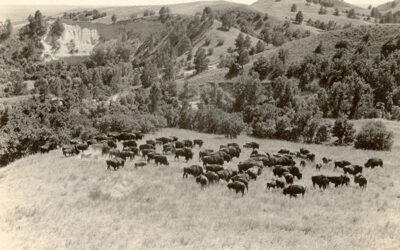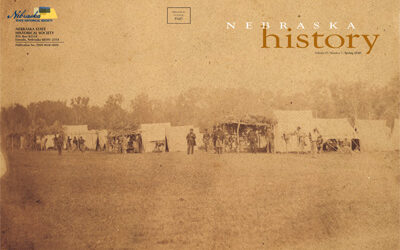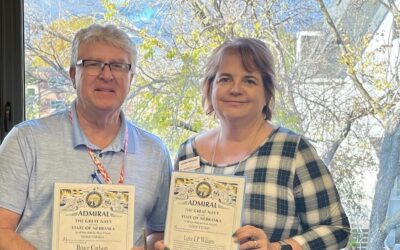As a recreational and learning experience, Chautauqua had much to offer: operas, plays, famous speakers, and classes on art, religion, and music, to name just a few. The movement was named for a lake in upstate New York, the site of the first Chautauqua in 1874, which was intended as a training session for Sunday School teachers. The evolution of a more entertaining atmosphere led to the development of the traveling tent shows, also called Chautauquas, in the early part of the twentieth century. In 1904 the first circuit Chautauqua was formed, which convened under an enormous canvas tent, and moved from place to place along a scheduled circuit.
The North Platte Valley Chautauqua, held August 7-16, 1908, in Scottsbluff was advertised by its management as “a complete, magnificent and varied entertainment.” The Scotts Bluff County Republican on May 29 published the lengthy and varied program:
“Music-instrumental and vocal; solos, quartettes, chorus and assembly singing. Humor-mirth and laughter. Amusements-Athletics, tennis, base ball, merry-go-round, automobiles, ‘Seeing Scottsbluff’ and points of interest surrounding. Moving pictures, illustrated songs. County teachers institute.
“Contracts already signed for the following talent: R. M. LaFollette-U.S. senator-presidential candidate-a lecturer and reformer of renown. Chas. Fordyce-Dean Nebraska Wesleyan University-‘The American Boy’ and other subjects. A. L. Bixby-Poet and humorist. Everybody calls him ‘Bix.’ Miss Pearl Wilkinson-Pianist and whistler ‘The Bird Song,’ etc. W. W. Gaines-Popular lecturer with a series of whirlwind lecturettes.
“Judge Geo. W. Norris-Congressman and lecturer. Norris Brown-United States Senator from Nebraska. Bill Bone-Humorist and poet. ‘The fellers call him Bill.’
“Carrie Nation-Saloon smasher-she of hatchet fame. J. L. McBrien-State superintendent of public instruction. ‘Our young folks what shall we do with them?’ etc. Ross Crahe-Cartoonist, clay moulder, known the world over for his chalk talk, ‘Swanee River,’ ‘The Bridge,’ etc. Dr. R. D. Wheeler-Sunday sermon and lectures. ‘The Cavalier and the Puritan,’ etc. C. A. Fulmer-Supt. Beatrice schools. Miss Lula Walford-State University in ‘Girls Domestic Science’ and ‘Boys’ Agriculture.
“Cornet band of 18 pieces each day. Other celebrities expected, among whom are: Thos. H. Carter-U.S. Senator from Montana. J. R. Garfield-Secretary of the Interior of the United States. Geo. L. Sheldon-Governor of Nebraska. Mondell-Congressman of Wyoming.”
In spite of its former popularity, circuit Chautauqua did not survive the Depression. By 1930 it was already declining, a victim of changing tastes and advances in technology. Automobiles were then common enough that even people in rural areas could drive to town to see the new sound movies. Those who preferred to stay at home could listen to radio. There was little besides nostalgia to attract a new generation to Chautauqua.



